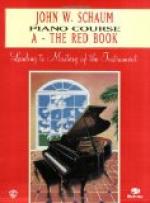“Pugno had played the piano almost from infancy, and in early youth had taken several piano prizes. Later, however, he gave much more of his time to the organ, to the seeming neglect of the former instrument. How his serious attention was reverted to the piano happened in this wise. It was announced that Edward Grieg, the noted Norwegian, was coming to Paris. Pugno was one day looking over his piano Concerto which had recently appeared. ’Why don’t you play the work for the composer when he comes?’ asked a friend. ‘I am no pianist,’ objected Pugno. ‘Why not?’ said his friend; ’you know enough about the piano, and there are still four weeks in which to learn the Concerto.’ Pugno took the advice, practised up the work, played it in the concert given by Grieg, and scored a success. He was then thirty-nine years of age. This appearance was the beginning; other engagements and successes followed, and thus he developed into one of the great pianists of France.
“Pugno was a born pianist; he had a natural gift for technic, and therefore never troubled himself much about teaching technical exercises nor practising them. If the work of a pupil contained technical faults, he made no remarks nor explanations, but simply closed the music book and refused to listen any further. The pupil, of course, retired in discomfiture. He was fond of playing along with the pupil (generally with the left hand), or singing the melodies and themes, in order to give him ideas of the meaning and interpretation of the music. This gave independence to the pupils, though it often afforded them much amusement.
“With advanced students Pugno spoke much about music and what it could express; he translated themes and passages back into the feelings and emotions which had originated them; he showed how all emotions find their counterpart in tones. ’Above all let kindness and goodness control you,’ he once wrote; ’if you are filled with kindness, your tone will be beautiful!’
“Pugno’s instruction took the form of talks on the inner meaning of the composition, and the art of interpreting it, rather than any training on the technical side; about the latter he concerned himself very little. It goes without saying that only talented pupils made progress under such a master; indeed those without talent interested him not at all. He was a wonderful teacher for those who had the insight to read between the lines, and were able to follow and absorb his artistic enthusiasms.
“I have said that Pugno did not concern himself about teaching the technical side of piano playing. Even with me, his best pupil, he rarely touched upon technical points. I must mention a notable exception. He gave me one technical principle, expressed in a few simple exercises, which I have never heard of from any one else. The use of this principle has helped me amazingly to conquer many knotty passages. I have never given these exercises to any one; I am willing however, to jot them down for you.”




